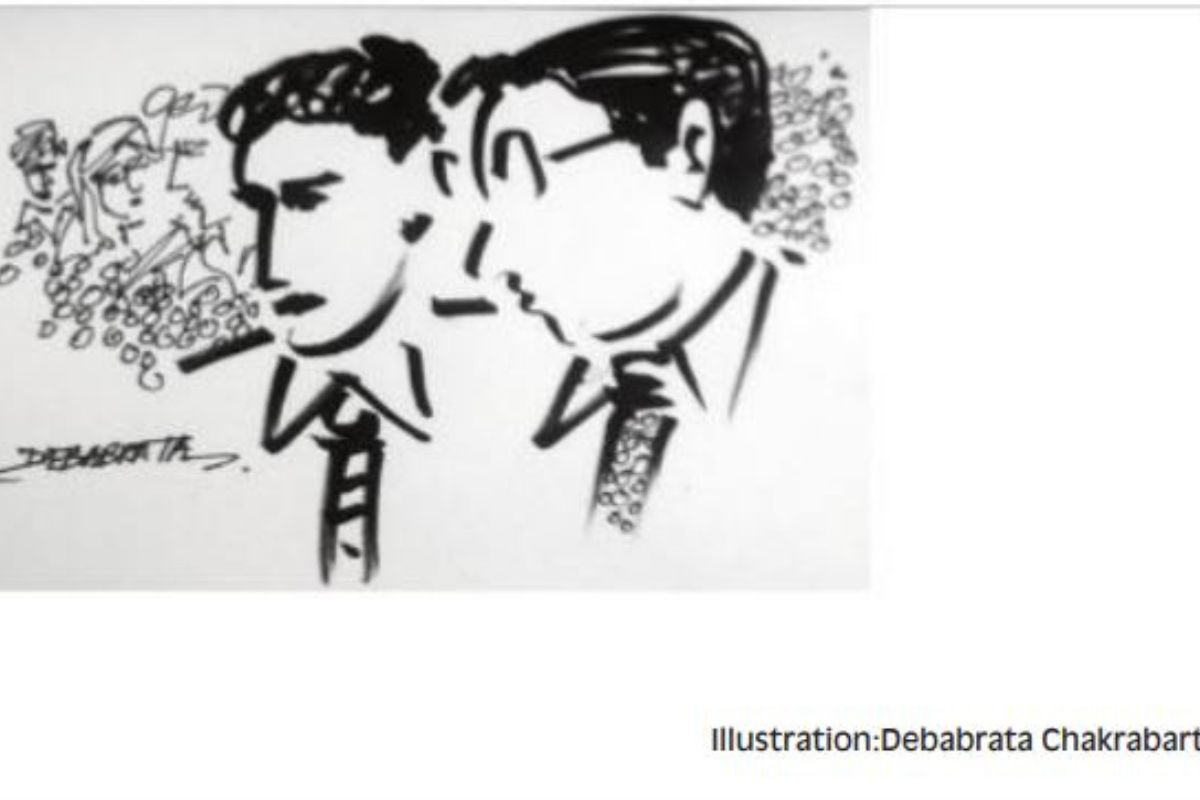Weekend delight: Fruity Cottage Cheese Canapes
Filled your weekend with fruity cheesy canapes. Here's a step-by-step recipe on how to make delicious canapes
I knew Ravi was a controversial person. I did not know how controversial. He joined the administrative department where I worked and was allotted an office next to mine.

Illustration:Debabrata Chakrabarty
I knew Ravi was a controversial person. I did not know how controversial. He joined the administrative department where I worked and was allotted an office next to mine. We quickly became friends. He was a good-looking, articulate man, who came, did his work and went home. He did not seem particularly social; he made no effort to cultivate his colleagues in our department.
I went out of my way to talk to him, for he seemed an interesting person. Guarded at first, he turned gradually affable. I invited him for lunch at a Japanese restaurant. He invited me for dinner at his home. I found his wife charming and enjoyed meeting his children. It was then that I discovered that he had a large circle of friends and he maintained an active social life. His weekly parties were lively affairs and I became a fixture.
Ravi not only invited me every time, but he also took care to make sure I met all his friends and was generous in his remarks introducing me. I realized that he had many friends because he was remarkably thoughtful with them. He enjoyed their company and went to great lengths to make their visits to his home enjoyable. He was the most punctilious host I had ever known, constantly checking you had enough canapés and your glass was full.
Advertisement
Ravi had moved to our department from the marketing division, where he had been a rising star for several years. Somehow his stock had suddenly sunk, and he was abruptly transferred to our department under a cloud. I never judge a man by the rumours he evokes; I did not ask Ravi what caused his ejection from another part of the company.
Quite by accident the marketing director, Parikh, called me for a meeting. He said his division was planning a strategy session to deal with new market trends and the finance director had recommended my name as a source of maverick ideas. I was flattered, but I was attracted even more by Parikh’s interest in new ideas. He appeared genuinely anxious to innovate. The session took place three weeks later.
The entire time I worked with Parikh in developing alternative strategies, some of them quite novel and unusual, and they proved invaluable in generating probing questions and heated discussions. Parikh and his colleagues thought it was a successful meeting and invited me to a celebratory dinner at Parikh’s home. It was a very pleasant evening. We basked in the glow of a successful project and some thought it would lead to money-spinning initiatives. Parikh was in an upbeat mood and insisted, at a late hour after dinner, that we all share his favourite cognac.
Unexpectedly, the conversation turned to Ravi and his ejection from the marketing division. Parikh turned out to have been the main force in engineering his removal and proudly declared that, with Ravi gone, the division would function better. He went a step further and said, “Ravi was a worthless fellow. I think our division is better off without him.” Seated around him were his important deputies. One quickly responded, “No question, he was quite worthless.” The one next to him felt he had to take up the cue and said, “I am glad he is out of our division. He was useless.”
The others, perhaps aided by their inebriation, promptly added to the chorus. One referred to Ravi as a “known rascal” and another chose to nominate him as a “total bastard.” Suddenly, Parikh turned to me and said, “I hear he has become your close friend. I am sorry if it bothers you, but Ravi was really a bastard.” The cognac had begun, in the last few minutes, to taste a little tasteless. I took a deep breath. I said to Parikh, “I know Ravi for only a few months. Many of you know him for years. You know him much better. If you think he is a bastard, he must be one.
“But, you see, I can only speak of what I know. Not only I can, I must. I must bear witness to what I have seen and known to be true. “Let me say what that truth is. I know that Ravi is a wonderful husband. A loving, affectionate father. I also know that Ravi is a hard worker and a helpful colleague. “Most of all, I know that he is a superbly thoughtful and caring friend.
“So, I don’t care if he is a bastard. I care that he is a loyal friend and I cherish his friendship. That is the truth I know. To my last breath, I have to shout that truth from the housetop. Because that is the only truth I have known.” There was a stunned silence. A young nobody wasn’t expected to dare such a riposte to a senior director and his drumbeaters.
For a loquacious man, Parikh remained quiet for a while. Then he quietly said, “Manish is quite right to stand up for his friend.” Then he had the extraordinary sense to correct himself, “Rather, he is right to stand up for what he thinks is the truth.”
Advertisement